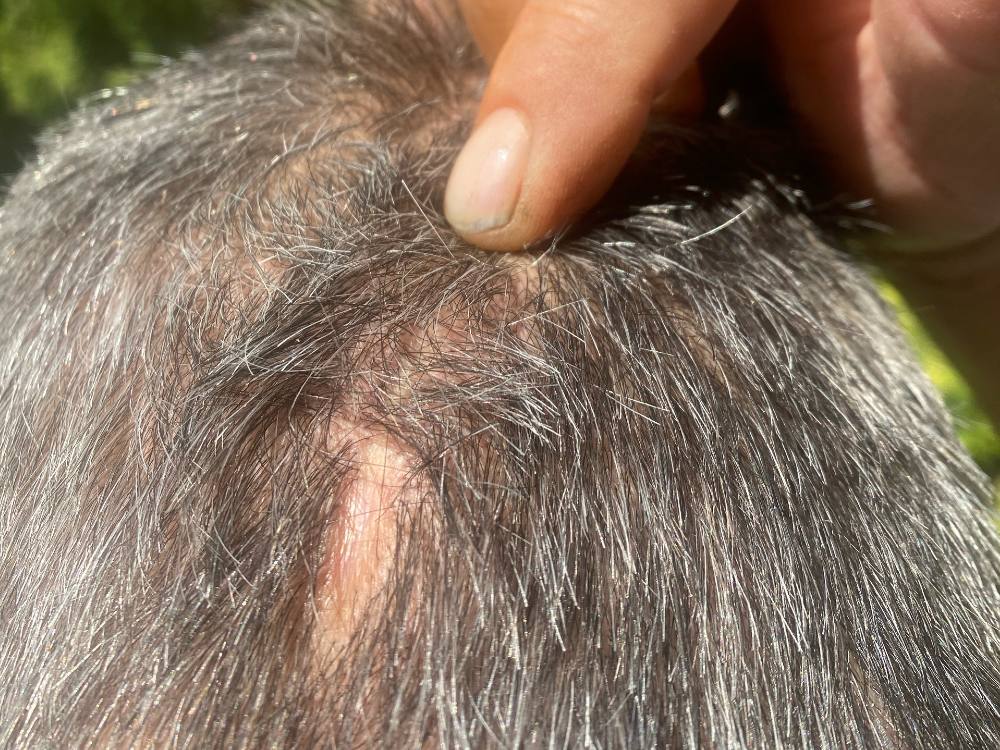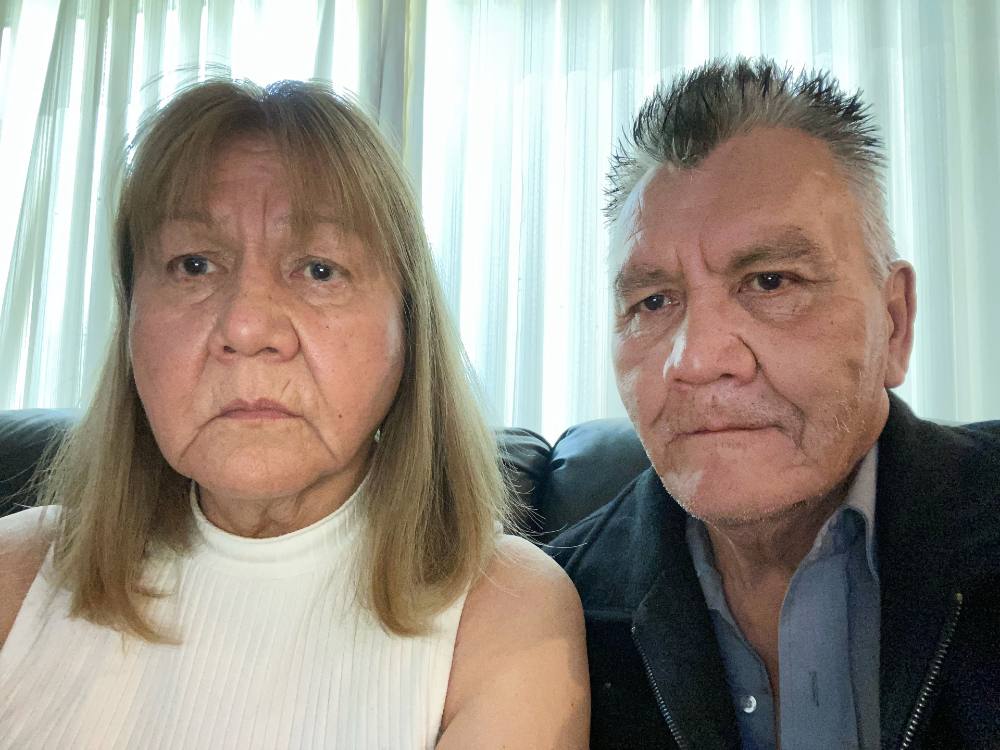[Editor’s note: This article contains disturbing information about Indian day schools and stories of trauma and abuse. It may be triggering to some readers.]
Richard Perry arrived at Immaculata Elementary School in Burns Lake eager to learn.
Born and raised in the northern B.C. community, he began attending the school in Grade 2. It was the late 1960s and his father and grandparents were keen for him to read, write and learn to speak English. At home, the family spoke the Carrier dialect of the Lake Babine Nation.
But Perry struggled to read. When that happened, he was met not with encouragement and support, but with abuse, he told a human rights tribunal last week.
“I thought they were going to teach us ABC and things like that,” Perry said. “We got hit all the time.”
As he testified Tuesday morning, Perry showed the tribunal scars left by his time at Immaculata — on both hands and the back of his head. He was the second witness to share stories of his time at the Burns Lake elementary school as a Canadian Human Rights Tribunal embarks on weeks of testimony into allegations the RCMP discriminated when it investigated former students’ complaints of abuse at two northern B.C. schools.
At the centre of the complaint is A.B., the school’s gym teacher and disciplinarian, according to witnesses, described by Perry as the “muscle guy.” His identity is protected by a confidentiality order issued in September by the tribunal.
An 18-month RCMP investigation into the abuse allegations against A.B. wrapped up a decade ago without charges. It’s that investigation — one the complainants say was flawed and discriminated against them as Indigenous people — that is the focus of the current inquiry.
Despite attending Immaculata for several years, Perry never learned to read or write. He gave much of his testimony in his Carrier language. His sister, Myrtle Perry, sat next to him, translating her brother’s words.
“He was going to school and instead of learning, being taught, what we thought was going to happen, he was being abused a lot to the point that he couldn’t take it,” Myrtle translated for the tribunal.
Perry said that, instead of nurturing the children, instructors at Immaculata “threw the Bible at us,” physically abusing them when they struggled in their lessons. They were called “demons” for speaking their Carrier language, he said, and hit on the hands and head.
The gym teacher would hit him with a basketball, he said. On another occasion, A.B. “chased me home,” he said. “He tried to catch me and I ran right home to my uncle.... He was trying to hit me.”
Most dreaded was the boiler room, where A.B. and the sisters who taught at the school would drag the students to punish them, witnesses said. “It was very noisy. They can’t hear the screaming from the other person,” Perry said.
Perry described being taken to the boiler room on one occasion for speaking Carrier. As one of the sisters hit him on the hands and head using a ruler with a spike driven through it, “One guy held me down,” he said. He named A.B.
The beating left an inch-long scar on the back of his head, which he showed to tribunal Chair Colleen Harrington.

Perry reported the abuse to his father, who approached the school’s priest. “‘Why don’t you teach my son that good English?’” Perry said, his voice breaking with emotion as he recalled his father’s words.
The family also reported the abuse to police, he added.
But nothing changed. His family made the decision to pull him from Immaculata in Grade 6. He went to work on his grandparents’ farm and never returned to school.
The experience left mental scars as well. As an adult, Perry — who now has five grandchildren and holds the Hereditary Chief name Gwista — believed that approaching police about his experience was futile. “I didn’t think nobody would listen,” he told the tribunal on Tuesday. “Nobody cared about me.”
As Perry shifted from English into Carrier, his sister stepped in to translate: “Natives are abused a lot by the RCMP,” she added.
But when an investigative journalist, Laura Robinson, visited Burns Lake in 2012 wanting to talk with survivors from Immaculata and Prince George College, another school where A.B. taught, Perry agreed to provide a statement.
“I trusted her,” he said.
Robinson would go on to publish a story about the allegations in the Georgia Straight in September that year. Despite the legal battle that ensued between the journalist and A.B. (the latter’s defamation suit eventually withdrawn while Robinson lost her countersuit), the article remains online.
According to opening statements made Monday by Karen Bellehumeur, lawyer for the complainants, RCMP officers investigating the abuse allegations dismissed the stories on the belief that the journalist had “manipulated the Indigenous complainants for her own purpose.”
Perry’s statement to Robinson, dated May 2, 2012, which outlined his experience at Immaculata, was read for the tribunal. He said Cathy Woodgate, also from Lake Babine Nation and lead complainant in the complaint filed to the Canadian Human Rights Commission in 2016, wrote it down. Woodgate died in 2021 before she had the chance to testify.
Robinson read the statement back to Perry before he signed it, he said.
Nearly a year and a half later, in October 2013, two RCMP officers came to interview Perry, the tribunal heard. In the recorded interview, the officers asked few questions as Perry shared his experience of being hit, kicked and strapped at Immaculata. He described bruising, showed his scars and talked about seeing a young girl leave the boiler room in tears.
The entire interview lasted 24 minutes, Bellehumeur said. Perry was provided no emotional support or followup information.
When asked by Bellehumeur what he believed police had done with his statement, Perry tossed the printed copy aside. “Garbage,” he said.
“Nothing happened from there,” he added. “No charges against anybody.”
Perry’s testimony at the tribunal went ahead despite RCMP delays in providing an audio recording of the interview, something Bellehumeur asserted would provide the officers’ tone and a reference for Perry, who was unable to read the transcript.
Bellehumeur said she had asked repeatedly for the recording, which she said the RCMP was obligated to provide when the complaint was referred for inquiry.
“This complaint is three years old and we’re still without the audio recording of his only statement to police,” she said. “There’s just no reason why the RCMP wouldn’t have retained this recording and we’re asking for an explanation.”
The recording was provided later that day and Perry completed his testimony on Wednesday.
During a 25-minute cross-examination, Department of Justice lawyer Spencer Slipper, representing the RCMP, focused on Perry’s connection to Robinson and the journalist’s role in producing his statement. When asked if Robinson had suggested what Perry should say at Tuesday’s hearing, the witness shook his head emphatically, “No.”
“Whose idea was it for him to give that statement?” Slipper asked Myrtle. “Did he not understand what was in that document?”
After consulting with her brother in Carrier, Myrtle responded on his behalf.
“This statement is his,” she said. “My father was there, too, and he understood what was being said. All the abuse, all the feelings, all the things that he’s gone through — he didn’t expect anything to happen because of all the neglect that had happened with the complaints to the police department [and] the school.”
When asked if Perry understood the purpose of the statement he provided to the journalist, Myrtle said her brother believed it would help tell the story of harms experienced by Indigenous children.
“His understanding is that, by telling his story, there would be an awareness brought into society about how bad Immaculata school was to First Nation people,” she said. “He explained to the best of his ability that he was tortured and abused at Immaculata school.”
Slipper suggested that RCMP officers who visited his home had built rapport with Perry and provided the space to share his story. “The RCMP officers made you comfortable, is that correct?” he asked.
After speaking with her brother, Myrtle responded.
“It was hard for him to talk. The reason he opened up to the policemen was because he wanted to get the story out, no matter how painful it was, and he never heard back,” she said. “It was not that they made him feel comfortable, but they let him tell his story. Most of the time they said, ‘uh-huh.’”
Myrtle relayed that her brother’s hope for the inquiry is that RCMP begin treating First Nations people better and that an Indigenous judicial system is created.
The complainants seek an order that RCMP divest its abuse investigation services in Indigenous communities and replace them with an independent investigative team, created by the communities, in keeping with the Declaration on the Rights of Indigenous Peoples Act, according to a statement of particulars.
Tribunal Chair Colleen Harrington is tasked with reaching a decision about whether RCMP discriminated against the complainants based on evidence from the hearings, which continue this week in Burns Lake before moving online May 23 to June 1 and June 12 to 22. ![]()
Read more: Indigenous, Rights + Justice


















Tyee Commenting Guidelines
Comments that violate guidelines risk being deleted, and violations may result in a temporary or permanent user ban. Maintain the spirit of good conversation to stay in the discussion and be patient with moderators. Comments are reviewed regularly but not in real time.
Do:
Do not: